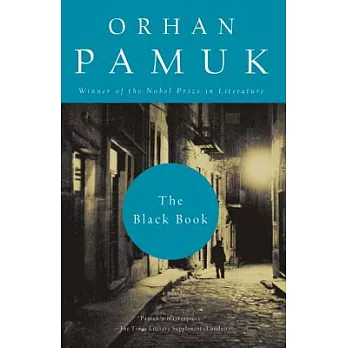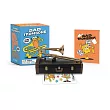Chapter One
The First Time Galip Saw Ruya
Never use epigraphs-they kill the mystery in the work! -Adli
If thats how it has to die, go ahead and kill it; then kill the false prophets who sold you on the mystery in the first place! -Bahti
Rüya was lying facedown on the bed, lost to the sweet warm darkness beneath the billowing folds of the blue-checked quilt. The first sounds of a winter morning seeped in from outside: the rumble of a passing car, the clatter of an old bus, the rattle of the copper kettles that the salep maker shared with the pastry cook, the whistle of the parking attendant at the dolmus stop. A cold leaden light filtered through the dark blue curtains. Languid with sleep, Galip gazed at his wifes head: Ruyas chin was nestling in the down pillow. The wondrous sights playing in her mind gave her an unearthly glow that pulled him toward her even as it suffused him with fear. Memory, Celâl had once written in a column, is a garden. Rüyas gardens, Rüyas gardens ... Galip thought. Dont think, dont think, it will make you jealous! But as he gazed at his wifes forehead, he still let himself think.
He longed to stroll among the willows, acacias, and sun-drenched climbing roses of the walled garden where Ruya had taken refuge, shutting the doors behind her. But he was indecently afraid of the faces he might find there: Well, hello! So youre a regular here too, are you? It was not the already identified apparitions he most dreaded but the insinuating male shadows he could never have anticipated: Excuse me, brother, when exactly did you run into my wife, or were you introduced? Three years ago at your house, inside a foreign fashion magazine from Alâaddins shop, at middle school, outside the movie theater where you once sat hand in hand.... No, perhaps Rüyas memories were not so cruelly crowded; perhaps she was at this very moment basking in the one sunny corner in the dark garden of her memories, setting out with Galip in a rowboat.... Six months after Rüyas family moved to Istanbul, Galip and Ruya had both come down with mumps. To speed their recovery, Galips mother and Ruyas mother, the beautiful Aunt Suzan, would take the children out to the Bosphorus; some days it would be just one mother taking them by the hand and other days it would be both; whatever bus they took, it shuddered as it rolled over the cobblestones, and wherever it took them-Bebek or Tarabya-the high point of the excursion was a tour of the bay in a rowboat. In those days it was microbes people feared and respected, not medicines, and everyone agreed that the pure air of the Bosphorus could cure children of the mumps. The sea was always calm on those mornings, and the rowboat white; it was always the same friendly boatman waiting to greet them. The mothers and aunts would sit at the back of the rowboat, Rüya and Galip side by side at the front, shielded from their mothers gaze by the rising and falling back of the boatman. As they trailed their feet in the water, they would gaze at their matching legs and the sea swirling around their delicate ankles; the seaweed and seven-colored oil spills, the tiny, almost translucent pebbles, and the scraps of newspaper they strained to read, hoping to spot one of Celâls columns.
The first time Galip saw Rüya, six months before coming down with the mumps, he was sitting on a stool on the dining room table while a barber cut his hair. In those days, there was a tall barber with a Douglas Fairbanks mustache whod come to the house five days a week to give Grandfather a shave. These were the days when the coffee lines outside Alâaddins and the Arabs grew longer every day, when the only nylon stockings you could find were the ones on the black market, when the number of 56 Chevrolets in Istanbul grew steadily larger, and Galip pored over the columns that Celâl published every weekday on page two of Milliyet under the name Selim Kacmaz, but it was not when he first learned how to read, because it was Grandmother whod taught him two years before starting school. Theyd sit at the far end of the dining table. After Grandmother had hoarsely divulged the greatest mystery of all-how the letters joined up to make words-she would puff on the Bafra shed seen no reason to remove from the side of her mouth, and as her grandsons eyes watered from the cigarette smoke, the enormous horse in his alphabet book would turn blue and come to life. A was for at, the Turkish word for horse; it was larger even than the bony horses that pulled the carts belonging to the lame water seller and the junk dealer they said was a thief. In those days, Galip would long for a magic potion to pour over the picture of this sprightly alphabet horse, to give it the strength to jump off the page; later on, when they held him back in the first year of primary school and he had to learn how to read and write all over again under the supervision of the very same alphabet horse, he would dismiss this wish as nonsense.



 天天爆殺
天天爆殺  今日66折
今日66折 

























 博客來
博客來 博客來
博客來 博客來
博客來 博客來
博客來 博客來
博客來